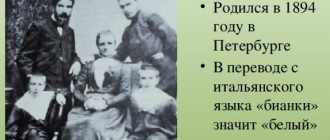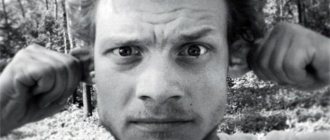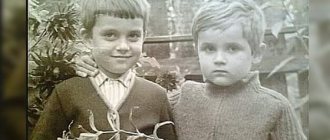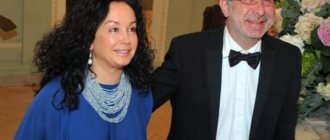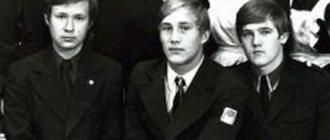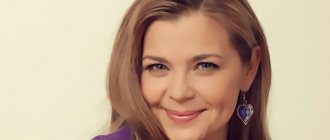You can talk about the Russian computer genius non-stop for a very, very long time, without losing a single word of admiration, because this man is Evgeniy Kaspersky. His biography is full of achievements of the highest level. This man is a brand in himself, a billionaire programmer, the head of a self-created international computer security company that sells software in at least two hundred countries and has more than thirty representatives in the regions.
In addition to running the company, he works extensively for the Computer Virus Research Organization, regularly reviewing the topic, writing articles, and developing computer protection. The Laboratory is thriving, and the biggest contribution to this is made by the director and main owner, Evgeny Kaspersky.
Biography
He was born in 1965 in Novorossiysk. The family was intelligent and had nothing to do with programming. His father worked at a cement plant as an engineer, and his mother was an archivist-historian. Only Evgeniy Kaspersky himself truly fell in love with mathematics in the family. His biography was built on this love.
From Novorossiysk, the parents moved near Moscow - to Dolgoprudny, where the boy studied at an excellent school and attended a special course in his favorite subject. Childhood, family, parents - the biography of Evgeny Kaspersky, as the only son, was built only on love and mutual understanding. The parents liked their son’s hobby, and they supported him in every possible way: they bought special books and helped him in everything.
The result was brilliant. In 1980, Evgeny Kaspersky, whose biography was already beginning to take shape in a certain way, won the All-Union Mathematical Olympiad, and therefore entered the Kolmogorov boarding school. Everyone already knew then that this educational institution belonged to Moscow State University. However, there were higher educational institutions in the country that were much cooler. In 1987, it became clear that the choice made made Evgeniy Kaspersky’s biography look even richer: he received a diploma in mathematics engineering from the KGB Higher School. This was followed by several years of service, up to the rank of senior lieutenant.
Evgeniy Kaspersky
Kaspersky Evgeniy Valentinovich was born on October 4, 1965 in Novorossiysk, Krasnodar Territory. Currently lives in Moscow.
Education
He studied at secondary school No. 3 named after Gastello in Dolgoprudny, and as a schoolboy began to study mathematics in depth as part of a special course. Having won the Mathematics Olympiad in 1980, he was enrolled in Physics and Mathematics Boarding School No. 18 named after A. N. Kolmogorov at Moscow State University, from which he graduated in 1982.
In 1987, he completed his studies at the technical faculty of the KGB Higher School in Moscow, where he studied mathematics, cryptography and computer technology. Received a diploma in mathematical engineering.
Labor activity
In 1987, he got a job at a multidisciplinary research institute under the USSR Ministry of Defense. Having encountered the Cascade virus in 1989, I decided to focus on studying similar computer enemies. After analyzing the virus code, he developed a special utility to treat it and became interested in this topic.
In 1991, he continued his career at the KAMI Information Technology Center. Led by him, a small group of specialists was developing anti-virus solutions, and already in November 1992, the team presented its first full-fledged product - AVP 1.0. In 1994, their antivirus won a comparative test conducted at the University of Hamburg. Thus, its development gained worldwide fame.
In 1997, he and his colleagues decided to open their own company, and Kaspersky Lab was born. One of the co-founders of the company was Evgenia’s former wife, Natalya, and it was she who insisted on this name (using her last name). In November 2000, AVP received the name “Kaspersky Anti-Virus”.
He personally directed anti-virus research at the Laboratory from its founding for about ten years, and in 2007 he took over the post of CEO. Owns 82.7% of shares.
Co-author of several patents in the field of information security, including a patent for a restrictive attribute security system that controls the interaction of software components.
Founder of the Virus Bulletin conference, organized in the antivirus industry since 2001.
Member of the Computer Virus Research Organization (CARO), which brings together experts in the field.
Charity
In 2017, with his sponsorship, the “Mathematical Vertical” was launched at school No. 1409.
His brainchild also helps the Athens Archaeological Society in implementing a project to preserve the ruins of an ancient city, excavations of which are being carried out on the Greek island of Santorini.
Publications
The author of numerous articles and reviews on the problem of computer virology, regularly speaks at specialized seminars and conferences in Russia and abroad.
He is the author of the following books: “Computer Viruses in MS-DOS” (1992), “Travel Notes” (2006), “Let's Celebrate the New Year in the South!” (2010), “Machu Picchu & Muchas Pictures” (2011), “Top 100 places in this world that you really need to see” (2012).
Awards and titles
In 2015, he received the Presidential Award of the Republic of Armenia for global contribution to the IT field.
2012: Foreign Policy magazine placed the mathematician in 40th place among the hundred most influential thinkers of the year (Top-100 Global Thinker); among the “most dangerous people in the world” according to Wired magazine, he took eighth position - for exposing American cyber weapons created for espionage in the Middle East and disrupting the Iranian nuclear program; received an honorary doctorate from the University of Plymouth; entered the Top 25 Innovators of the Year and Top 100 IT leaders according to CRN; recognized as "Technology Hero of the Year" by online publication V3.
2011: World's Most Influential Security Executive, SYS-CON Media; Businessman of the Year, American Chamber of Commerce in Russia; "For outstanding contribution to business", CEO Middle East.
2010: CEO of the Year, SC Magazine Europe; “For Lifetime Achievement,” Virus Bulletin; Awarded for leadership in brand development strategy, World Brand Congress;
2009: National Friendship Award of the People's Republic of China; Heihe River Friendship Award; State Prize of the Russian Federation in the field of science and technology.
In 2007 he was awarded the “Symbol of Science” medal.
Ratings and personal fortune
He is regularly included in the list of the two hundred richest Russian businessmen published by Forbes magazine. Thus, in 2011 it ranked 125th, in 2013 - 134th (both years with a mark of $800 million). In 2015, his fortune reached a billion dollars (86th line of the ranking), in 2016 he rose further to 66th position with a mark of $1,100 million. In 2020 and 2020, he ranked 70th among the richest people Russian Federation ($1.3 and $1.4 billion, respectively).
In 2019, it ranks 72nd with a fortune of $1.3 billion.
Hobbies
Alpine skiing, kayaking and mountaineering. Loves photography and travel.
It is a sponsor of the most titled Formula 1 team, Scuderia Ferrari, and the DS Virgin Racing team, which participates in the Formula E championship, a class of electric car racing.
Fun fact: he starred in a commercial for his product with Jackie Chan.
Family status
Married to his second wife Natalya (divorced in 1998), he had two sons - Maxim and Ivan (born in 1989 and 1991, respectively). After the divorce, the ex-spouses continued to be business partners, but in 2012, Kaspersky Lab and the wife’s company, Infowatch, became independent businesses.
Biography of the ex-wife
Shtutser Natalya Ivanovna was born on February 5, 1966 in Moscow.
From the eighth grade she studied at a school with a physics and mathematics focus at the Moscow Aviation Institute (MAI). She entered the Moscow Institute of Electronic Engineering (MIEM). In 1989, she completed her studies at the Faculty of Applied Mathematics. In 2009, he entered into a third marriage, his wife being Chinese. They have three children, the eldest started school in 2016.
Job
The science of mathematics was always easy for him, cryptography and computer technology were extremely interesting, and therefore success was obvious. Immediately after graduation, the first triumphs appeared in the biography of Evgeniy Kaspersky. He got a job at a multidisciplinary research institute that existed under the auspices of the USSR Ministry of Defense. This was the service.
This is where research into computer viruses began. Success did not happen overnight; it took the programmer ten years to establish himself properly in the field of anti-virus protection of operating systems, after which it was already possible to organize his own business.
How it all began
The biography dates back to October 4, 1965 - on this day the future computer genius appeared in Novorossiysk, Krasnodar Territory. Young Zhenya developed an interest in mathematics as a child - fortunately, his mother noticed this and tried in every possible way to support him in her son. So the talented boy ended up in physics and mathematics school No. 18, named after Academician Kolmogorov.
The educational institution was located at Moscow State University, but the graduate chose another alma mater - the Institute of Cryptography, Communications and Informatics, which was located at the KGB Higher School. This is where he became interested in cyberattacks. A little later, a fateful “meeting” between young Kaspersky and his… first virus happened: a computer was infected with a malicious program. But instead of destroying the uninvited guest, Evgeniy recorded the virus on a floppy disk and began to study it in detail - as a result, he was able to write a program to treat it. A little later, another new virus was planted on Kaspersky by a colleague – again, our hero neutralized the dangerous “hijacker” on his own. These cases prompted the future luminary of IT security to engage in antivirus programs.
Secrets
One of the most famous experts in the fight against cybercrime today is Evgeny Valentinovich Kaspersky. His biography is exceptionally rich in events, including dangerous ones for Evgeniy himself, “who saves the world every day,” and for his family. Everyone knows the incident with the kidnapping of his son. But this man was and remains a real threat to world hacking. Photos of Evgeniy Kaspersky can be easily obtained on the Internet, as well as the simplest information about him known to the whole world.
However, the main part of his life has always been closed to everyone and will probably never be fully revealed. At least not in our lifetime. For example, Evgeny Kaspersky only jokes about nationality. Jews, Germans, and Bulgarians place him on the branches of their family tree (the latter even spread the theory that he invented the computer in Bulgaria). In fact, the name is Polish, and Evgeniy Kaspersky himself is, first of all, a Soviet man.
Ivan Kaspersky’s girlfriend: “Vanya was not identified on the Internet”
Izvestia: Katya, how did you find out about the kidnapping? From Vanya's parents?
Ekaterina Selina: No, from intelligence officers. They immediately found out that I was the last person to see Vanya before the kidnapping, so they asked about everything, down to the smallest detail. I have a car, and every morning we drive to work together. I drop him off near the office in the same place, and then I go alone. It turns out he was kidnapped right after I drove away.
and: How did you survive these terrible days?
Selina: I was completely in the dark for five days. No one informed me how the liberation operation was progressing. On the first day, out of despair, I tried to find out for myself and dialed his mobile phone twice, but he was unreachable. And I decided not to call at all: what if the kidnappers get angry? Only later did they tell me that these people almost immediately removed the battery from the phone and it no longer turned on. Living in the unknown for five days was terrible, so I turned off the phone myself and stopped going to school. It was not enough for my classmates, who had learned about everything, to attack with questions.
and: What did he say when you saw each other after the kidnapping?
Selina: You know, we had no time to talk. We just fell into each other's arms and fell asleep instantly. Later, after resting, he talked about what he had experienced. His main memory is being completely lost in time. At first they carried him blindfolded for a very long time, then he sat in a dark bathhouse for an eternity. He could not understand how much time had passed - an hour, two or ten. He hardly slept. Firstly, probably because I was nervous. And it was difficult to sleep in captivity. Imagine the situation: he is handcuffed, darkness, uncertainty. Moreover, instead of a toilet there is an ordinary bucket that stands nearby. It’s good that Vanya was fed regularly and wasn’t touched. Force was used only once - when they tried to get him into the car. After all, Vanya resisted with all his might.
Now he is better, he has cheered up a little and is almost back to normal. True, it doesn’t go anywhere. Getting some sleep after sleepless nights. And I come to him every day. Ask where? Don't bother. I still won't tell.
and: Apparently, they were following both of you. Have you noticed anything? Maybe strange calls or suspicious people at the entrance?
Selina: Nothing. We don’t even have a home phone! To be honest, the FSB was generally amazed at how this gang managed to reach Vanya. You see, this family has nothing to do with the Kasperskys at all. They just had an idea: to kidnap the son of some rich man. Now they say that Vanya himself posted everything about himself on the Internet. But this is not true. On some network page he actually posted the address, but, as they say, from a street lamp.
Ekaterina Selina: This address had nothing to do with reality. But then a chain of some fantastic coincidences followed, and the bandits were somehow able to reach our apartment. I’m amazed, because Vanya and I actually don’t use social networks. Only VKontakte, but there is almost no information about us there either. And these people... I don’t even know what to call them... They had nothing to do with us... Nothing at all...
Izvestia: How did you and Ivan meet? In the University?
Selina: This happened before I entered university. I took preparatory courses and met Vanya’s friends. And then, just on the first of September, I met him himself. During these four years, of course, a lot happened. But... You know, he is incredibly gentle and caring! Because of me, he even started learning to ride a snowboard; this year we went skiing several times in the Moscow region. Although he himself loves rollerblading, and used to ski.
and: Isn’t it strange for you that the son of such parents, the heir to millions, works as an ordinary programmer?
Selina: Not at all. He is very diligent and loves his job very much. Before the kidnapping, he was working on a very important project - software for equipment that allows you to detect cancer cells in the body. And this has to be combined with full-time studies. Vanya, by the way, passes all his sessions with straight A's. You should have seen his scientific works! In general, we live like everyone else: we run around shopping, fuss about housework, go to the cinema. Now, though, I don’t know when we’ll get out.
The Savelyev family at the Presnensky court: Nikolai Sr., his wife Lyudmila and their son Nikolai Jr.
Kidnapping for better health
On Tuesday, the suspects in the kidnapping of Ivan Kaspersky were taken to the Presnensky court, where a preventive measure was chosen for them. 60-year-old Nikolai Savelyev, his wife Lyudmila Savelyeva and their son 29-year-old Nikolai Savelyev were arrested. The woman was taken into custody despite the head of the family’s attempt to take the blame.
“Yes, of course, I admit my guilt,” Nikolai Savelyev Sr. said in court. - But my wife was not aware of the matter.
The accused said that he committed the crime to “improve his health.” True, he refused to specify what exactly he was sick with. He denied the information that overdue loans prompted him to kidnap him. As for Savelyev Jr., he did not admit guilt.
“All I did was not tell about my father’s actions,” he explained his role as an accomplice. — That is, he didn’t act like Pavlik Morozov. At the same time, I treated Ivan Kaspersky as if I were my own.
1989
From this year on, the direction of all future activities of one of the most famous and most influential people in the world was clearly outlined. It was in 1989 that the successful programmer got his first personal computer. And, as it turned out, infected. At the origins of the development of personal computers, few people knew about viruses; they were extremely rare. Such simple ones, even primitive ones, would probably be funny to today’s programmer.
But they didn’t yet know how to fight them. Kaspersky was lucky; fate itself cooperated, slipping the infection into the very first computer, which Evgeniy cured without difficulty. But I saved the virus on a floppy disk for study. After analyzing this malicious program (it turned out to be “Cascade-1704”), Kaspersky wrote a “healing” utility. He did all this purely out of curiosity, but the Air Force General Staff itself became interested. From then on, viruses began to arrive to the programmer constantly, more and more new, more and more complex. Kaspersky cracked them like nuts.
The day it all began
The year is 1989. An ordinary evening. SA senior lieutenant Evgeniy Kaspersky works magic on his broken computer. At that time, only the initiated and advanced had any idea about the viruses that infect PCs. But the malware “did not ask permission” from the young officer when it infected his computer.
It turned out that the knowledge acquired at the Institute of Cryptography, which Evgeniy graduated from, was not superfluous at all: the machine was “cured.” It was this evening that became a turning point in my life.
1991
In 1991, another fateful event happened: the already well-known programmer was accepted into KAMI - the Information Technology Center, where he continued to work on anti-virus programs. Six years of work at this institution yielded an exceptionally good result - the Kaspersky Anti-Virus program, which very soon became popular both in Russia and in all CIS countries.
The level of protection was very high, and this new product soon began to be installed not only on the computers of various companies, but also on almost every personal one. The program was constantly being improved, new versions appeared, also very successful. And in 1997, Evgeny Kaspersky and a small group of colleagues and like-minded people founded Kaspersky Lab, which quickly became a large company with its main office in Moscow, and its representative offices were opened in various parts of the world.
Recognition and further career of Kaspersky
Soon, the program developed by Kaspersky to protect your computer from viruses became one of the most popular in Russia and the CIS countries. Critics noted the high level of protection, and buyers from various companies willingly installed the new product on their computers. Soon, Evgeny Kaspersky began work on a number of new versions of the program, which were also a great success.
Evgeny Kaspersky has a calling at the highest level
Soon, Kaspersky Lab, founded in 1997 by a small group of like-minded people, turned into a large company with its head office in Moscow and representative offices in various parts of the world. Currently, Kaspersky is one of the world's leading experts in the field of virus protection. He is the author of a huge number of articles and publications devoted to the problem of computer virology.
In addition, Evgeniy regularly speaks at various conferences and seminars in Russia and abroad, telling listeners about various nuances of countering cyber attacks. Kaspersky Lab cooperates with many large global companies, and also provides information support to American, Brazilian, Polish, Israeli and Russian intelligence agencies. The company's turnover, according to some sources, is more than $650 million a year.
In 2012, Kaspersky Lab united more than two and a half thousand employees. For his work, Evgeny Valentinovich was awarded many prestigious awards, including the State Prize of the Russian Federation (2009) and the Runet Prize (2010). In 2012, the American publication Foreign Policy placed him forty in its ranking of the most notable thinkers of the year.
Who is Kaspersky?
Cooperation
Conferences and seminars on computer virology are held on behalf of the company, both in our country and abroad. Students are taught to resist hacker attacks. Now information is being exchanged with the intelligence services of Russia, Israel, Poland, Brazil, and America, and the company’s turnover has grown incredibly. The exact figure is unknown, but in the early 2000s, experts calculated about seven hundred million dollars a year.
From history: the founder of the company really did not want to put his own name on public display, but in those days Evgeniy Kaspersky had already had his personal life for a long time. And his first wife, Natalya Kasperskaya, insisted on exactly this name for the future brand. She also became a co-founder. Simultaneously with the launch of his own company, SecureList opened - an Internet portal that is an encyclopedia of viruses, errors, vulnerabilities, and malware. The information is constantly updated; it is published on two pages - in English and Russian versions.
Personal life
For the first time, the legendary cybercrime fighter married a future prominent businesswoman, Natalya. She became the co-founder of his “Laboratory” in 1997. In short, Evgeniy Kaspersky and his wife had a lot in common. The photo speaks of such intimacy, which, it would seem, is not afraid of any ups and downs of life. But in 1998 they divorced. However, they did not part completely, remaining friends, colleagues and partners, maintaining the most trusting relationships. Their two sons, Maxim and Ivan, were raised together.
And since Evgeniy Valentinovich almost immediately married again, the children perceived the two families as one. The first wife also formed a new family, and very often they vacationed together - with two families, maintaining high relations. Only in 2012 did Natalia and Evgeniy cease to be business partners.
Evgeniy Kaspersky's third wife is Chinese. Photos of this couple from 2009 - the beginning of their relationship - and to this day are simply impossible to find on the Internet. “All three of our common children speak both Russian and Chinese fluently, which, of course, enriches the world of their communication,” says Evgeny Kaspersky. “A Chinese wife is wonderful!”
First steps in programming
According to the official biography of Evgeniy Kaspersky, the programmer began studying computer viruses in 1989. It was during this period that the now famous programmer got his first personal computer. However, it soon became clear that the PC was infected. It is worth noting that at that time computer viruses were still very rare. In addition, most of them were very primitive. Therefore, dealing with them was not so difficult.
“I disinfected my computer - I don’t remember with what program,” recalls Kaspersky. “But I saved one virus on a floppy disk. I was curious how it worked." As it later turned out, this virus turned out to be the “Cascade 1704” program. Having figured out its device,
Kaspersky wrote his own utility designed to treat it. As the programmer himself notes, all this was done purely out of curiosity. However, the Research Institute of the Air Force General Staff became interested in spontaneous development.
Evgeny Kaspersky knows how to treat computers Some time later, one of his then colleagues appeared in Kaspersky’s office and brought another virus on a floppy disk, inviting the programmer to write a program to eliminate it. “I dealt with him. I became interested - and away we went,” Evgeniy recalled many years later.
In 1991, the future famous programmer went to work at the KAMI Information Technology Center, where, together with a group of colleagues, he continued to work on a number of anti-virus programs. Evgeniy Valentinovich will work in this organization until 1997. One of the results of his work will be the famous Kaspersky Anti-Virus.
Family
The new wife works at the Pushkin Institute. As they say, she is a smart and delicate person. Kaspersky values gentleness in women most of all, and intelligence about the same. Maxim, the eldest son, did not follow in his father’s footsteps; he nevertheless chose Moscow State University and its geography department. Ivan is also at this university, but he studies computational mathematics and cybernetics. In 2011, something terrible happened - something that wealthy families often experience.
Ivan was kidnapped from the metro and demanded a ransom - a measly three million euros for his precious life. The Moscow criminal investigation department worked well, the criminals were quickly detained, and Ivan was returned safe and sound to his parents. But anything could have happened. You can imagine how worried loved ones were if the whole country was so worried that strangers on trams shared fresh information with each other: “Did you catch it?.. How, still not?!” And so on for five days, until the situation was resolved by the capture of the criminals.
Everything is “excellent” in my personal life!
This is precisely the assessment that can be given to today’s marital relations of Evgeniy Valentinovich. He is married for the second time, and met his future wife while skiing. The wife fully corresponds to all the businessman’s ideas about women, embodying intelligence and delicacy of character. She is a worker in the humanitarian sphere - the Russian Language Institute. A.S. Pushkin.
He maintained good relations with his ex-wife Natalya (also co-founder of the Laboratory) and sons Maxim and Ivan. And they are so good that families often vacation together, each with his new family.
Photo 9. Natalya with her sons: there is no ex-family!
As for children, Maxim, the eldest son of a computer genius, did not want to follow in his father’s footsteps - he chose the Faculty of Geography of Moscow State University. And the younger Ivan has a not-so-good kidnapping story: criminals grabbed a child near the metro and demanded a ransom of 3 million rubles. However, thanks to a special operation carried out jointly with the FBI, the criminals were caught and punished.
Apart from this unpleasant episode, the life of our hero is somewhat reminiscent of an interesting kaleidoscope: you never know what interesting event will turn out next. One thing is clear: it will definitely be extraordinary, just like Evgeniy Valentinovich Kaspersky himself, whose biography will be replenished with worthy discoveries and bright moments.
Hobbies
The most important hobby of the famous programmer is skiing. And in general, he really loves extreme types of recreation - kayaking, car racing (he collaborates with the Ferrari brand, follows Formula 1 with great attention). Takes great photographs. He travels a lot, and prefers virgin, wild places. Loves Kamchatka.
He maintains a blog where he talks a lot about the work of the company, about cybersecurity, but there are about the same number of photographs taken with his own hands in the most beautiful places on the planet, as well as many stories about interesting events, from which you can better see the activities of this self-confident, integral and positive tuned person. In addition to the blog, Kaspersky has an Instagram account.
State
In 2020, Evgeniy Kaspersky’s fortune was estimated at $1.1 billion. According to Forbes, he ranked 86th in the ranking of the richest Russians. The creators of Kaspersky Lab claim that they have no outside investors. The company develops thanks to its own profit turnover, and they value its independence very much. In principle, there is still enough profit for development.
All of Kaspersky’s significant investments are connected only with his “Laboratory”. He does not play any extraneous business games. The success of his own company is his main business. According to him, the only property he owns is Kaspersky Lab, a Moscow apartment and a BMW car; he has nothing else, and he doesn’t need anything else.
Kaspersky admitted that he “actually lost his son” due to his kidnapping
Hearings continue in the Khoroshevsky Court of Moscow in the case of the kidnapping of Ivan Selin (Ivan Kaspersky), the son of the general director of Kaspersky Lab, Evgeny Kaspersky. Ivan Kaspersky was kidnapped in Moscow in April 2011. The kidnappers demanded 3 million euros from Evgeniy Kaspersky for his release. A few days after the kidnapping, Russian intelligence officers released Ivan Kaspersky and detained the criminals. During today's meeting, Evgeny Kaspersky stated that he received a call from his son's kidnappers while in London. After the call, despite the warning not to contact the security services, Kaspersky immediately called the security service (, and then the unknown person said not to worry and under no circumstances contact the security services. I realized that I needed to contact the security service. I told the unknown person, that I was in London, sleeping, not thinking right now and asked to call me back later. I immediately called the security service and reported what had happened," said Evgeny Kaspersky. According to Kaspersky, during communication with the kidnappers they once made a threat, and he perceived this threat realistically. “Once there was a threat, it was said, “I don’t want to take sin on my soul,” I perceived this phrase as a direct threat to the life and health of my child. I tried to avoid aggression, to behave correctly, but the words “I don’t want "let me understand that the threat is real,” said the general director of Kaspersky Lab. According to RAPSI, when the lawyers asked how long ago he had communicated with his son, Kaspersky said that he had lost contact with the child. “The fact that I lost contact with him, the main reason for this is the kidnapping. I actually lost my son,” said Evgeny Kaspersky. He added that he had repeatedly advised his son not to post personal information on social networks, namely phone numbers and addresses, but he ignored his advice. After the abduction, all members of his family took advantage of the protection. Evgeny Kaspersky also said at the court hearing that he filed a civil claim against the defendants in the amount of 3 million euros - equal to the ransom for his son. “The amount of the claim is similar to the ransom. I believe this is how the damage was done to me. Serious moral and indirect material damage was caused: the news was widely covered in Western media, people still come up to me and ask how my son is. The damage was caused not only to me morally, but also to the country’s reputation,” Kaspersky said. Nikolai Savelyev and his son Nikolai Savelyev Jr., as well as Semyon Gromov and Oleg Mayukov are accused of kidnapping Ivan Kaspersky (Selina). Also involved in the case was former intelligence officer Alexey Ustimchuk, but earlier he made a deal with the investigation and in 2012 the court sentenced him to 4.5 years in prison
. According to the investigation, intelligence officer Ustimchuk entered into a conspiracy with father and son Savelyev, as well as Gromov, to carry out the kidnapping of Ivan Kaspersky. On the instructions of the Savelyevs, Captain Ustimchuk purchased three foreign cars and twenty mobile phones with anonymous contracts from cellular telephone operators. On the morning of April 19, 2011, accomplices kidnapped the son of the general director of Kaspersky Lab, Ivan Kaspersky, from one of the streets of Moscow, took him to the Moscow region and held him for five days. The young man was kept in a bathhouse in the Moscow region. The leader of the criminal group repeatedly called Evgeny Kaspersky and the young man’s mother, demanding a ransom of 3 million euros for his return. A few days later, operatives figured out the location of the kidnappers using a mobile phone signal. On April 24, 2011, employees of the Moscow Criminal Investigation Department, together with the FSB, carried out an operation to free Ivan Kaspersky. The hostage was not injured during the operation. All the kidnappers were arrested. They were charged under Art. "kidnapping" and "extortion". Later, the organizer of Kaspersky’s kidnapping, Nikolai Savelyev, stated that he treated the hostage “like his own” and did not beat him. And the kidnappers needed money for “treatment” and to pay off debts. A.
Purpose
Kaspersky is at the very forefront of modern cyber warfare, he is fighting against the destroyers of our future - computer viruses. And the fact that our life today is unthinkable without information technology is clear to everyone. There will be more to come. There have been rumors that have been going on for many years about the Laboratory’s connections with the intelligence services. Evgeniy Kaspersky himself does not comment on any rumors. no matter what they concern, he does not advertise his party sympathies.
The press service of the Laboratory calls rumors on this topic slander. However, there is clearly cooperation! And it is necessary. It is impossible for law enforcement officers to do without the help of such specialists today. So, in June 2020, it was Kaspersky who helped them find fifty hackers (Lurk group).
On guard
And a little earlier, in 2015, Kaspersky Lab uncovered cyber espionage, the victims of which were Israel, Egypt, Palestine, Jordan and other countries of the Middle East, where a huge number of victims of the Desert Falcons operation turned out to be. It is not only the Middle East that has suffered. Even in Russia the virus was discovered. More than fifty countries lost over a million valuable files.
These were mainly government agencies, military departments, media, research and educational institutions, and large energy companies. Political leaders and activists who possess critical geopolitical information were harmed. Kaspersky Lab discovered all three groups of hackers of Arab origin who carried out their malicious activities in different countries.

